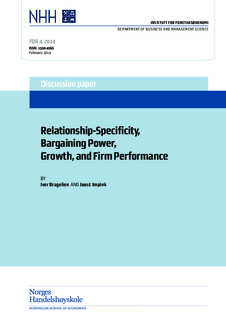| dc.contributor.author | Bragelien, Iver | |
| dc.contributor.author | Impink, Joost | |
| dc.date.accessioned | 2014-05-14T06:11:36Z | |
| dc.date.available | 2014-05-14T06:11:36Z | |
| dc.date.issued | 2014-02 | |
| dc.identifier.issn | 1500-4066 | |
| dc.identifier.uri | http://hdl.handle.net/11250/194961 | |
| dc.description.abstract | We investigate the relevance of relationship-specificity in explaining firm performance
and firm value. First, we use an incomplete contracts model to derive
hypotheses on how relationship-specificity interacts with bargaining power
and growth. And, second, we test these hypotheses on US data for the period
1998 to 2012. We use contract intensity introduced by Nunn (2007) to measure
relationship-specificity at the industry level. Relationship-specific investments are
considered to be low when a company’s inputs are sold on an exchange and high
otherwise. Using size as a measure for bargaining power, we find support for
our hypothesis that the benefits of bargaining power increase with relationshipspecificity.
We also find that growth has a stronger impact on firm value when
relationship-specificity is high, indicating that the continuation value of the relationship
matters. | nb_NO |
| dc.language.iso | eng | nb_NO |
| dc.publisher | FOR | nb_NO |
| dc.relation.ispartofseries | Discussion paper;04/14 | |
| dc.subject | VDP::Samfunnsvitenskap: 200::Økonomi: 210::Samfunnsøkonomi: 212 | nb_NO |
| dc.title | Relationship-specificity, bargaining power, growth, and firm performance | nb_NO |
| dc.type | Working paper | nb_NO |
